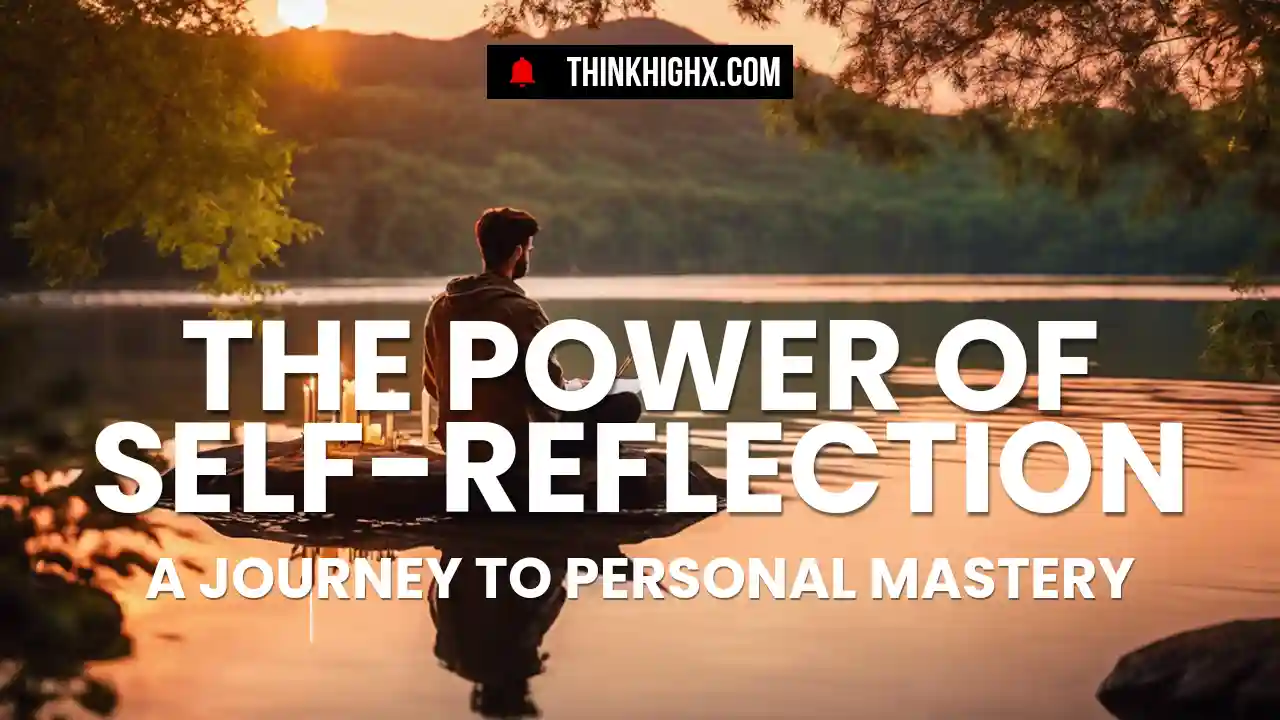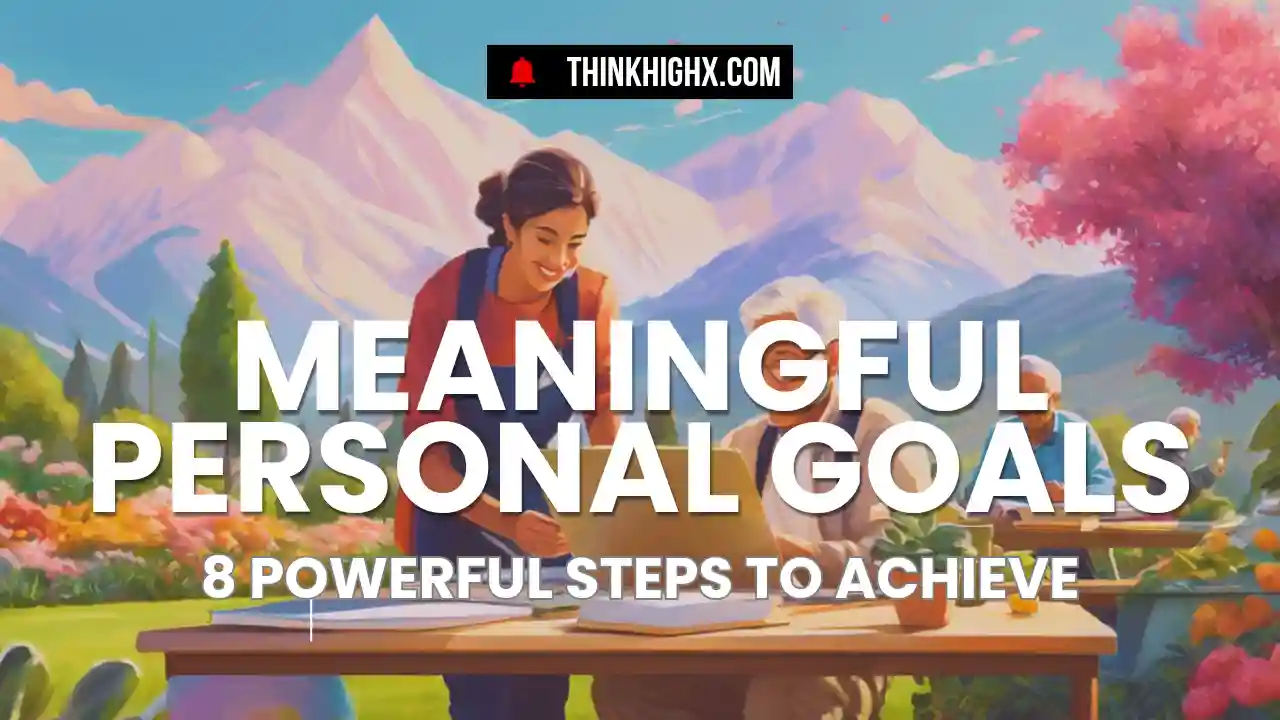The Power of Self-Reflection: A Journey to Personal Mastery
Table of Contents

As human beings, our greatness lies not so much in being able to remake the world—that is the myth of the atomic age—but in being able to remake ourselves.
Mahatma Gandhi
Introduction to The Power of Self-Reflection
Today I am going to tell you about how you can dramatically change your life so that you will find yourself better and better. I am talking about the power of self-reflection. Yes, truly it has the power to change how you think, interact with people. From long time in history till today, it is a proven method to enhance ourselves.
In today’s fast-moving world, we rarely pause to look at ourselves. Most of the time, we are busy keeping up with our daily routines and challenges. But what if I told you that taking a moment to reflect on your own thoughts and actions can change your life? This practice is called self-reflection, and it has the power to transform your personal and professional life in ways you never thought possible.
When we reflect, we gain a deeper understanding of ourselves. We start to see things that we did not notice before—our strengths, weaknesses, and the reasons behind our decisions. In a world that is constantly pulling us in many directions, self-reflection helps us find balance and clarity. Today, I will take you through the journey of self-reflection, not as a theory but as a practice that can bring real, lasting change.
What is Self-Reflection?
Self-reflection is the process of looking back at our own thoughts, actions, and emotions to understand them better. It is a way of thinking deeply about who we are and what we do. When you reflect, you are asking yourself questions like, “Why did I react that way?” or “What could I have done differently?” This is not about judging yourself harshly but understanding yourself more deeply.
7 Key Aspects of Self-Reflection
- Enhanced Self-Awareness
Self-awareness means understanding who you are at your core. When you reflect on your actions and emotions, you become more aware of your values, motivations, and triggers. This self-awareness is the foundation of personal growth. You start to notice patterns in your behavior that can either help or hinder your progress. - Improved Decision-Making
By reflecting on past decisions, you can make better ones in the future. You begin to understand what led you to certain choices and what the outcomes were. This process helps you think critically before making new decisions, ensuring that you consider all the options and their potential consequences. - Emotional Intelligence
Self-reflection helps you become more in tune with your emotions. You start to recognize how you feel in different situations and why you feel that way. This emotional intelligence allows you to manage your emotions better, especially in challenging situations, leading to healthier relationships and better communication. - Goal Clarity
When you reflect on your life and your actions, your goals become clearer. You start to see what truly matters to you and what does not. This clarity helps you set more meaningful and achievable goals, both in your personal and professional life. - Stress Reduction
Taking time to reflect can reduce stress. When we are constantly moving from one task to another, our minds become cluttered. Reflection gives us a chance to slow down and clear our minds. By understanding the reasons behind our stress, we can find ways to manage it more effectively. - Increased Resilience
Self-reflection builds resilience. When you take the time to understand your failures and challenges, you learn from them. This helps you bounce back stronger when faced with new difficulties. Reflecting on how you overcame past challenges gives you the strength to face future ones with confidence. - Creative Problem-Solving
Sometimes, the best solutions to problems come when we step back and reflect. By thinking deeply about an issue, we can find new ways to approach it. Reflection opens up space for creativity, allowing us to see things from different perspectives and come up with innovative solutions.
Self-reflection is not just about looking at what went wrong; it’s about celebrating what went right and learning from both. Through the power of self-reflection, you become more attuned to your inner world and the way it interacts with the outer world.
Watch: The Power of Self-Reflection
The Benefits of Self-Reflection
Self-reflection is not just a practice that enhances personal awareness; it brings about tangible benefits in both your personal and professional life. As we dive into the specific advantages, you will see how this powerful tool can improve nearly every area of your life.
1. Personal Growth
One of the greatest benefits of self-reflection is personal growth. When you take the time to look within yourself, you can see where you are and where you want to be. You begin to identify the habits and mindsets that are holding you back and the strengths that can propel you forward. With this self-knowledge, you start to make conscious choices that lead to positive changes in your life. Personal growth is a lifelong process, and self-reflection is the key to staying on the right path.
2. Stronger Relationships
Self-reflection helps you build stronger relationships. By reflecting on your interactions with others, you can understand how your words and actions affect those around you. You become more mindful of your behaviour, leading to better communication and fewer misunderstandings. Additionally, self-reflection allows you to recognize when someone else may be struggling or in need of support, strengthening your connections with loved ones, friends, and colleagues.
3. Accountability
When you reflect on your actions, you become more accountable for your choices. This sense of accountability drives you to take responsibility for your life rather than blaming external factors. It empowers you to make changes where needed and take ownership of your successes and failures. Accountability fosters a sense of control over your life, boosting your confidence and self-respect.
4. Authenticity
Self-reflection allows you to live more authentically. By understanding your true values and desires, you can align your actions with who you really are. This authenticity helps you feel more comfortable in your own skin and gives you the confidence to pursue what truly matters to you. When you are authentic, others are drawn to your honesty and sincerity, which can lead to more meaningful relationships and professional success.
5. Mental Clarity
In a world full of distractions, self-reflection helps clear the mental clutter. It gives you a chance to step back from the noise of everyday life and focus on what is truly important. Through reflection, you can prioritize your thoughts, manage your emotions, and make sense of complex situations. This mental clarity leads to better decision-making and a greater sense of calm in your day-to-day life.
How to Practice Self-Reflection
Now that we have explored the benefits of self-reflection, let us talk about how to incorporate this practice into your daily life. The power of self-reflection is most effective when it becomes a regular habit, something you do consistently, rather than just once in a while.
1. Establishing a Routine
The first step in practicing self-reflection is establishing a routine. Choose a specific time each day, perhaps in the morning or before bed, to dedicate a few minutes to reflection. Consistency is key. You do not need a lot of time—even 10 minutes a day can make a significant difference. By making self-reflection a part of your daily routine, it becomes a habit that supports your personal growth.
2. Using Guided Prompts
Sometimes, it can be challenging to know where to start when reflecting. This is where guided prompts come in handy. Asking yourself specific questions can help you dive deeper into your thoughts and feelings. Here are some examples of questions you can use:
- What was the highlight of my day?
- How did I handle challenges today?
- What am I grateful for right now?
- What could I improve for tomorrow? These questions help you focus your reflection and make the process more meaningful.
3. Combining Mindfulness with Reflection
Mindfulness and self-reflection go hand in hand. While mindfulness is about staying present and aware in the moment, reflection is about looking back and understanding those moments. By practicing mindfulness during the day, you become more aware of your emotions and actions as they happen. Then, during your reflection time, you can look back on those moments and learn from them. Combining these practices helps you become more intentional in your life.
4. Balancing Self-Critique with Compassion
Self-reflection can sometimes lead to harsh self-criticism, but it is important to balance critique with compassion. The goal of reflection is not to judge yourself harshly but to learn and grow. Be kind to yourself as you reflect on your actions and decisions. Celebrate your successes and be gentle when acknowledging your mistakes. This balance will help you stay motivated and prevent negative self-talk from derailing your progress.
Why Self-Reflection is Important Today
In today’s fast moving, technology-driven world, distractions are everywhere. Social media, work demands, and constant connectivity leave little room for introspection. We are often so focused on staying productive that we forget to take time to understand our own thoughts and feelings.
This is where the power of self-reflection comes in. By intentionally carving out time for introspection, we counteract the distractions that pull us in every direction. Self-reflection allows us to pause, take a step back, and look at the bigger picture. It gives us the opportunity to assess where we are, where we want to go, and how we can get there.
In the long run, this practice fosters personal growth and emotional well-being. It helps us stay grounded in our values and ensures that we are moving in the right direction. Without reflection, we risk losing ourselves in the hustle of daily life, never stopping to ask if we are truly happy or fulfilled.
Conclusion: The Power of Self-Reflection
Self-reflection is not just a practice—it is a transformative tool that has the power to change your life. By taking the time to look within, you gain valuable insights into who you are and what you want. This understanding leads to personal growth, stronger relationships, and greater mental clarity.
I encourage you to start your own self-reflection journey today. Whether you take a few minutes each day to reflect or set aside a longer period each week, the key is consistency. Over time, you will notice the profound impact self-reflection has on your life.
Through this simple practice, you can unlock deeper self-awareness and personal growth. Remember, the path to lasting transformation starts with a single step—and that step is self-reflection.
Resources for Further Exploration
To deepen your understanding of self-reflection, I recommend exploring the following resources:
Books:
- “The Power of Now” by Eckhart Tolle
This book explores mindfulness and living in the present moment, which complements the practice of self-reflection. - “The Road Less Traveled” by M. Scott Peck
A guide to spiritual growth and understanding life’s challenges through self-awareness.
Websites:
- MindTools.com
Offers practical articles and tools for personal and professional development, including guides on self-reflection techniques. - Greater Good Science Center (GGSC)
Provides science-based insights on well-being and emotional growth, including self-reflection.
Apps:
- Reflectly
A personal journaling app that uses AI to help you reflect on your daily thoughts and emotions. - Insight Timer
A meditation app that includes guided meditations focused on self-reflection and mindfulness.
By engaging with these resources, you can further develop your reflective practice and continue your journey of self-discovery.
FAQs (Frequently Asked Questions)
1. What is the power of self-reflection?
The power of self-reflection lies in its ability to foster personal growth and understanding. By regularly looking inward, we can gain insight into our thoughts, actions, and emotions. This process helps us learn from past experiences, make better decisions, and align our actions with our core values. Self-reflection boosts self-awareness, enabling us to see both our strengths and areas for improvement. In a fast-paced world, it offers a moment of calm to evaluate progress and set meaningful goals, promoting long-term development and balance.
2. What are the 5 benefits of self-reflection?
Self-reflection has several key benefits, including:
- Personal Growth: Helps you learn from past experiences.
- Improved Relationships: Understanding yourself enhances communication with others.
- Better Decision-Making: Learning from past choices helps refine future decisions.
- Accountability: Reflecting on actions fosters responsibility for your behavior.
- Mental Clarity: Taking time to reflect clears your mind and reduces stress.
These benefits help you grow in all aspects of life, making self-reflection an invaluable tool.
3. Why is reflection so powerful?
Reflection is powerful because it deepens self-awareness and promotes growth. By looking back on your experiences, you can understand your emotions, thoughts, and decisions better. It gives you the space to assess what worked, what did not, and what can be improved. Through reflection, you gain clarity on your goals and values, which leads to better decision-making and personal development. In a world full of distractions, reflection offers a rare opportunity to pause, focus inward, and make meaningful progress.
4. How to start self-reflection?
Starting self-reflection is simple, yet impactful. Begin by setting aside time daily or weekly to sit quietly with your thoughts. You can use guided prompts like “What did I learn today?” or “How did I feel about my actions?” Journaling is another effective method, as it helps organize thoughts. Combining mindfulness practices, like deep breathing or meditation, can enhance focus. Approach this practice with kindness—do not criticize yourself too harshly. Over time, regular reflection becomes a powerful tool for personal growth and self-awareness.
5. Why is self-reflection so hard?
Self-reflection can be hard because it requires vulnerability and honesty with oneself. Looking inward may bring up uncomfortable emotions, regrets, or truths that are difficult to face. In a fast-paced world, taking the time to slow down and think deeply can feel unnatural or even overwhelming. Additionally, many people fear judgment, even from themselves, which can make self-reflection feel like a confrontation. However, with practice, self-reflection becomes easier and can provide valuable insights for growth and self-improvement.
6. What are 7 questions you can use as self-reflection?
Here are seven self-reflection questions you can ask yourself:
- What did I achieve today, and how do I feel about it?
- What challenges did I face, and how did I handle them?
- What could I have done differently in today’s situations?
- How did my actions align with my long-term goals?
- What emotions did I experience, and what caused them?
- How did I interact with others, and was it positive?
- What can I improve upon tomorrow or next time?
These questions help you understand yourself better and make positive changes.
7. What happens if we don't reflect?
Without self-reflection, we risk repeating mistakes and missing opportunities for growth. When we do not take time to evaluate our actions and decisions, it becomes harder to learn from past experiences. This can lead to poor decision-making, unresolved emotions, and a lack of direction in life. Over time, the absence of reflection can cause us to drift through life without purpose or self-awareness, leading to frustration and burnout. Reflection is crucial for personal growth, self-awareness, and achieving long-term goals.

